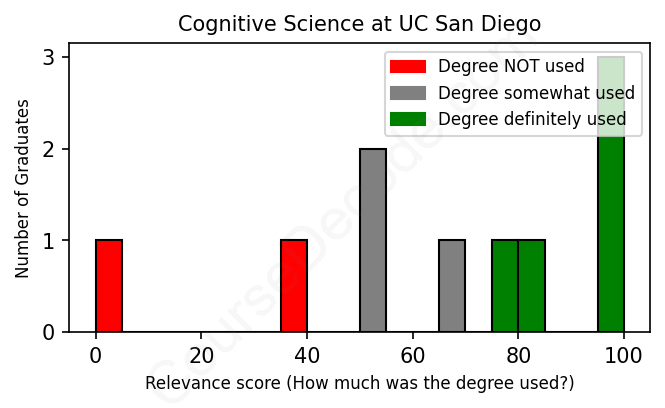
First, some facts. Of the Cognitive Science graduates from UC San Diego we've analyzed , here's how many have used (or NOT used) their degree in their career:

These are estimates based on AI analysis of 10 LinkedIn profiles (see below).
The verdict? Slightly below average. Overall, with an average relevance score of 66%, Cognitive Science graduates from UC San Diego have a slightly lower likelihood (-1%) of finding work in this field compared to the average graduate across all fields:
And for comparison, here's the chart for all profiles we've looked at across all degrees.
Also, after graduating, 50% of these graduates have pursued further education other than another Bachelor's degree (such as a Masters degree or other), compared to the average across all profiles of 35%. This suggests you may need more than just a Bachelors degree to be competitive as a Cognitive Science graduate.
See the details:
|
Relevance score: 79% We think this person has gone into a career highly relevant to their degree. We think this person has gone into a career highly relevant to their degree.
DEGREE INFOGraduated in 2019 from UC San Diego with a Bachelors in Cognitive Science. No other secondary education since. JOB HISTORY SINCE GRADUATIONContent Editor ShayTech Inc Sep 2019 - Mar 2020 Assistant Project Coordinator  ShayTech Inc Apr 2020 - Aug 2021 Project Business Analyst  ShayTech Inc Sep 2020 - Present ABOUTNo information provided. |
The top 10 most common jobs done by the graduates we've analyzed (ranked most common to least) are:
Looking at the job trends for grads from UC San Diego's Cognitive Science program, it seems like a mixed bag. Many graduates ended up in roles that aren't directly related to the field at all, like dentists or web developers. While some of these positions might touch on aspects of cognitive understanding—like user experience or human behavior—most don’t delve deep enough to make them truly relevant to their Cognitive Science studies. The folks working in tech and digital roles do benefit a bit from cognitive principles, but in many cases, the job responsibilities are more aligned with general technology skills rather than cognitive theory.
On the flip side, there are quite a few grads who found jobs that directly apply what they learned in their Cognitive Science classes. Positions like UI/UX designers and instructional assistants are great examples where they can really put their knowledge of human cognition and behavior to use. These roles help bridge the gap between understanding how people think and learning and designing products and experiences that cater to those insights. So, while many have ventured into roles that don’t obviously connect to Cognitive Science, there's definitely a good handful diving into work that fully embraces the degree’s core concepts!
Here is a visual representation of the most common words in job titles for Cognitive Science graduates (this is across all Cognitive Science graduates we've analyzed, not just those who went to UC San Diego):

When looking at the career paths of graduates from UC San Diego’s Cognitive Science program, it’s pretty clear that there's a mix of outcomes. For many who graduated in the past few years, their first jobs seem to lean heavily towards tech-focused roles, particularly in areas like software engineering, UX/UI design, and data analysis. This trend reflects a strong inclination toward applying cognitive science principles in tech environments, which is promising for those interested in creating interactive technologies or working with artificial intelligence. For instance, graduates have secured roles as speech engineers and product managers, which indicate they’re engaging with cutting-edge technologies right out of school.
However, it’s worth noting that not everyone from this program seems to be landing jobs directly aligned with cognitive science after five or ten years. Some have shifted into roles like dental practices or general administration, which might not utilize their degree directly. That said, those who stick to tech-related fields, like product management or in software development roles, seem to flourish as they climb the career ladder and find more specialized positions. Overall, while some graduates may branch out, a good number stay true to the cognitive science theme in their career trajectories, especially in the tech industry, where they can leverage their unique skill sets effectively.
Hey there! So, getting a Bachelor's degree in Cognitive Science at UC San Diego can be a bit challenging, but it's not impossible. The program is multidisciplinary, blending psychology, neuroscience, computer science, and philosophy, which means you'll have to juggle a variety of subjects and skills. Some students find the mix of heavy science courses and analytical thinking to be a tough combo, especially if math isn’t your forte. But if you’re curious and enjoy diving deep into how the mind works, you'll likely find it super rewarding! Overall, it’s probably about average in terms of difficulty compared to other degrees, with some courses being a breeze and others requiring a bit more effort. Just stay organized, keep up with the readings, and you should be good to go!
Most commonly, in the LinkedIn profiles we've looked at, it takes people 4 years to finish a Bachelor degree in Cognitive Science.
Alright, so let’s break it down. Looking at these UC San Diego grads, it seems like the ones in tech and healthcare are really cashing in. The dentist from the class of 2013 definitely raked in some decent money—dentists usually have good salaries, and that’s pretty clear here since they’ve been with multiple practices. The software engineers and product managers from more recent years are also likely doing well, especially since tech jobs tend to pay pretty well straight out of school. Those who started in entry-level roles, like the recent grads in design or administrative positions, might not be making bank yet, but they're still getting that experience, which will pay off down the road. Overall, it looks like a mixed bag, but with some solid earners leading the charge!
Here is a visual representation of the most common words seen in the "about" section of LinkedIn profiles who have a Bachelor degree in Cognitive Science (this is across all Cognitive Science graduates we've analyzed, not just those who went to UC San Diego). This may or may not be useful:

Here are all colleges offering a Bachelor degree in Cognitive Science (ordered by the average relevance score of their Cognitive Science graduates, best to worst) where we have analyzed at least 10 of their graduates:
| College | Score | Count |
|---|---|---|
 University of California, Berkeley University of California, Berkeley
|
70 | 19 |
 UC San Diego UC San Diego
|
66 | 10 |
 University of California San Diego University of California San Diego
|
60 | 13 |
 University of California, Merced University of California, Merced
|
58 | 10 |